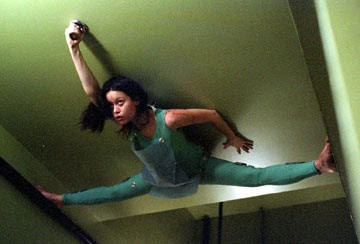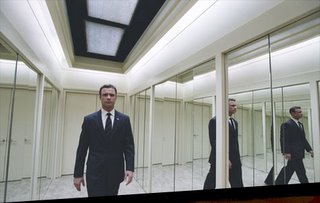Sounds like a Celtic wail, but in fact it stands for ‘Energy Return on Energy Invested’. It’s one of the key concepts in understanding PeakOil.
Oil is two things: a very dense source of energy, and one which is easily fungible.
The energy needed to get a barrel of oil (light crude) out of the ground in the Middle East is pretty minimal, and that barrel of oil returns some thirty times as much energy as it took to gain it. So the Energy Return on Energy Invested is 30:1.
That’s a great ratio. That means that energy is plentiful, we can do lots of things with it. And oil has certain properties – like being a liquid at normal temperatures – which make it ideal for use in transportation. The energy involved in pushing two tons of metal in a particular direction is rather large – think how many people it would take to push a car one mile, and you get some sense of how much energy is bound up in that gallon of petrol.
Peakoil is basically a recognition that this wonderful source of energy is finite. And several consequences flow from it.
1. As the oil (and possibly the coal that can be turned into oil) runs out, energy as such will become much more expensive. Some energy sources being touted, eg oil shales etc, have an EROEI of about 1.5:1 – in other words the benefit of extracting the oil becomes much more marginal. Given the tremendous complexity of extracting such oil, and the high degree of capital investment to carry out such a project, it seems dubious to me whether it would ever be economically viable on any but the simplest scale.
2. Oil as a resource for transportation cannot easily be replaced. It is possible that electricity could cover some elements – eg electric cars – but this again simply pushes the problem back to a) the power stations that may produce the electricity, and b) the creation and maintenance of such cars in the first place. Without oil, ie without plentiful and convenient energy, these things become much more difficult. So – things will become much more local.
3. Our system of food distribution depends on this easy energy. Without that easy energy a) there will be less food available (no cheap fertiliser); b) it won’t be transported anywhere. There still will be transport around, but it will resemble much more a 19th century system, not a twentieth century system. There won’t be refrigeration. So enjoy those bananas while you can! Food will return to being locally produced and dominated. The principal source of wealth will again be agricultural land.
4. This means that where there is no oil (and barring the miraculous invention of a new energy source) that over the coming decade(s) access to food is going to be a pressing issue. There will not be enough food to go round. The UK experience in the Second World War is worth pondering – everyone grew their own vegetables, and on the whole, there was enough to go around, in fact, people were much healthier on the whole. So – although we do have 15-20m more mouths to feed – we might be able to make enough food to keep most of our local population alive. But worldwide? I don’t think so.
5. The situation will be most acute in cities. Cities cannot provide their own food source – most of the land is now asphalt. Cities will not be good places to be in the coming decades. That is where most of the ‘die off’ will occur. I think there will be a horrible spasm of violence, but it won’t be maintained, simply because the maintenance of violence is itself a very energetic pursuit.
6. At the international level, governments will act to try to secure the oil supply for their own countries, to ensure that their own populations do not starve. This has already started, of course, but it could get much worse – US invades Canada anyone? (unlikely, extremely so, but not, I suggest, impossible).
7. The clash of civilisations: pretty soon we pass the point when 50% of the remaining oil is in 5 countries on the Persian gulf. That gives those five countries a huge amount of political power, at least temporarily. Add to this the
But I could be wrong on all of that.
The things to do now are: think locally; hope for the best, prepare for the worst, accept what comes. It is those who endure to the end who shall be saved.
Late addition: good article here – good in the sense that it is a perfect expression of the conventional thinking on energy resources, looking with an economist’s eye, not a geo-physicists – and therefore ignoring the question of EROEI.


